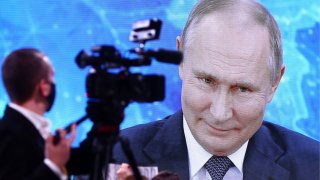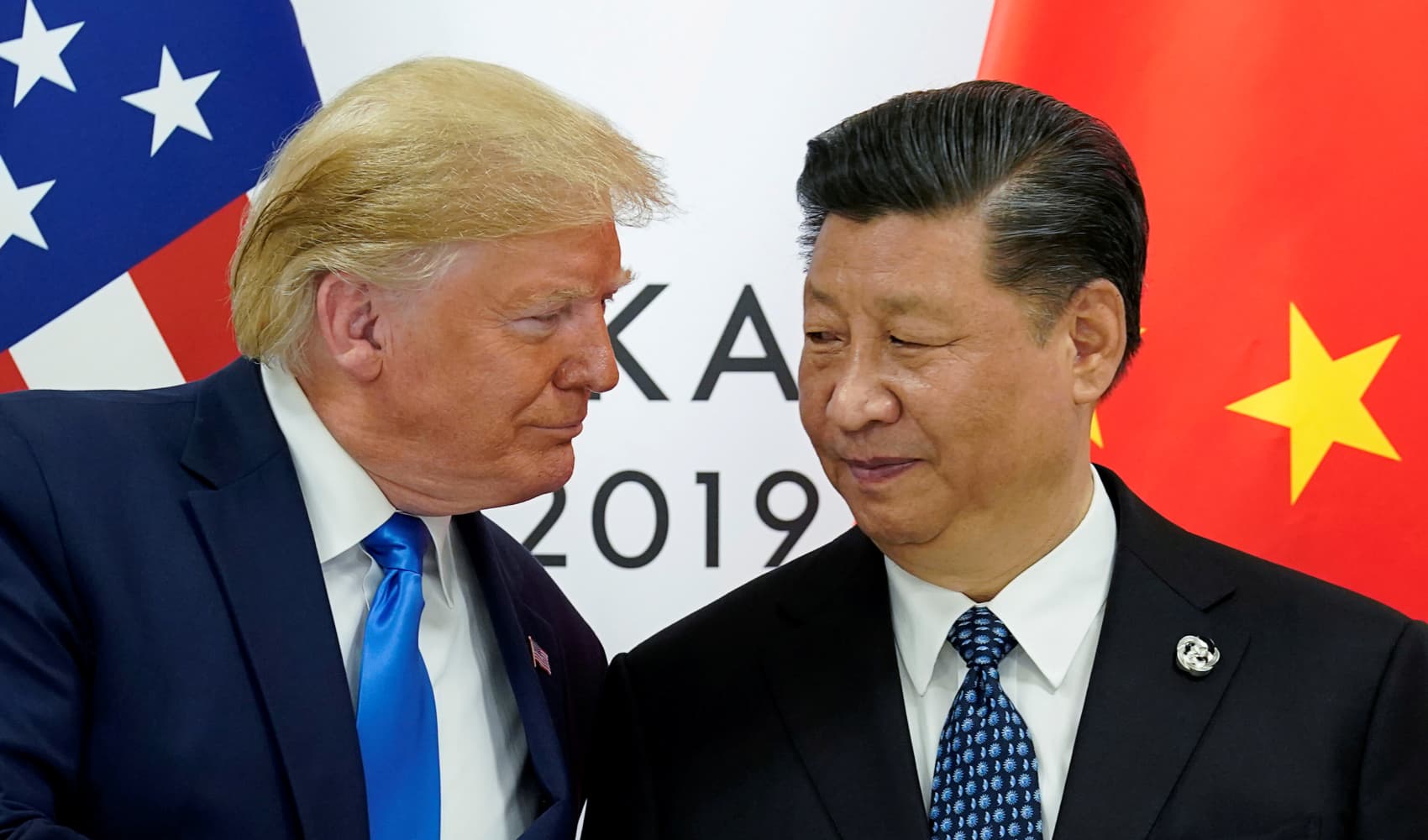
Russia’s President Vladimir Putin gives the 16th annual end-of-year news conference via video link to the World Trade Centre.
- When President Joe Biden meets Russian counterpart Vladimir Putin in June, it will be one of the most closely watched summits of the year.
- But there are doubts whether the summit can achieve much, given the poor state of relations.
- Not everyone is happy about the summit going ahead given recent tensions.
When President Joe Biden meets Russian counterpart Vladimir Putin in June, it will be one of the most closely watched summits of the year.
But there are doubts whether the summit can achieve much, given the poor state of relations.
And not everyone is happy about the summit even going ahead, particularly because of the detention of opposition leader Alexei Navalny and Russia's show of support for Belarus after Russia's neighbor diverted a commercial flight to allow Minsk on Sunday to detain a prominent critic of President Alexander Lukashenko.
Sen. Ben Sasse, a member of the Senate Select Committee on Intelligence, was among those voicing disapproval of the Biden-Putin summit. In a statement, the Nebraska Republican asked: "We're rewarding Putin with a summit?"
"Putin imprisoned Alexei Navalny and his puppet Lukashenko hijacked a plane to get Roman Protasevich. Instead of treating Putin like a gangster who fears his own people, we're giving him his treasured Nord Stream 2 pipeline and legitimizing his actions with a summit. This is weak."
Both the U.S. and Russia issued terse statements on Tuesday announcing the summit, neither demonstrating a keen anticipation of the event — perhaps unsurprisingly given the tense relations between the two nuclear powers.
Money Report
"The leaders will discuss the full range of pressing issues, as we seek to restore predictability and stability to the U.S.-Russia relationship," White House press secretary Jen Psaki said in a brief statement.
At a press briefing, Psaki was asked by several journalists what kind of message Biden's meeting with Putin sent to adversaries. She insisted the summit was not a "reward" for Russia. "This is how diplomacy works," she said. "We don't only meet with people only when we agree. It's important to meet with leaders when we have a range of disagreements, as we do with the Russian leader."
Win for Moscow
Analysts say the summit, set to take place on June 16 in Geneva, will be presented as a win for Moscow.
"The Russian state-owned media will spin the Putin-Biden summit in a way that emphasizes Russia's great power status and its indispensable role in addressing various global challenges," Andrius Tursa, Central and Eastern Europe advisor at Teneo Intelligence, told CNBC on Wednesday.
"Despite multiple points of contention between Moscow and Washington, the Kremlin will likely reassert its narrative of being a constructive international player on the global stage that often gets unfair treatment from the West."
The summit will be Putin's first foreign visit since January 2020, and one that Tursa noted gave Putin "high-profile visibility" ahead of the State Duma election in September.
But for Biden, the meeting will come hot on the heels of a flurry of geopolitical summits in Europe, the G-7 on June 11-13 in the U.K., and a NATO summit in Belgium on June 14.
Daragh McDowell, head of Europe and principal Russia analyst at Verisk Maplecroft, said the summit was advantageous for both sides.
"There is of course a domestic political benefit for Putin in the summit, which will be used to portray Russia as a great power on par with the U.S. However, those same benefits apply to Biden, who will be able to contrast his behaviour with President Trump's at the July 2018 summit in Helsinki, to bolster his domestic standing as well as reassuring U.S. allies."
At a press conference after the Helsinki summit, President Donald Trump told reporters he believed the Russian president's denial about interfering in the 2016 election, rejecting the consensus conclusion of the U.S. intelligence community.
Talking points
Russia won't be participating in either the G-7 or NATO meetings; It was suspended from what was then the G-8 in 2014 after its annexation of Crimea and similarly, NATO suspended all co-operation with Russia in response to its "aggressive actions" in Ukraine.
Nonetheless, Russia is likely to feature on the agenda of both high-profile events, given its poor relations with the West following its actions including the annexation of Crimea and backing of separatists in eastern Ukraine, meddling in the 2016 U.S. election, the 2018 nerve agent attack in the U.K., involvement in the 2020 SolarWinds hack and the alleged poisoning and jailing of Navalny. Russia denies all the allegations.
On top of that, there's arms control, climate change and Covid-19 to discuss. And more recently, suspicions that Russia could have given Belarusian dictator Lukashenko the green light to divert the Ryanair flight carrying an opposition activist Roman Protasevich to Minsk, whereupon he was promptly arrested.
Asked whether going ahead with a summit now was appropriate, and sent the wrong message to U.S. allies, Tursa said that "despite the lingering suspicions, Russia's involvement in the forced landing of a civilian aircraft in Belarus has not been proven to date" and that it was sensible for the Biden administration to keep lines of communication open with Moscow.
"The U.S. has clearly condemned Belarusian actions and is reportedly preparing sanctions on the Alexander Lukashenko regime. Finally, the Biden administration has been consistent in its approach towards Russia — keeping Moscow accountable for its malign activities without closing the door for political contacts and cooperation in other areas."
Low trust, low ambitions
Nonetheless, there are questions over whether anything substantial can be achieved, given the low degree of trust between the leaders.
McDowell said there were "genuine areas of bilateral interest for Russia and the U.S. that these summits can be useful in addressing, particularly nuclear arms control."
"However, other areas like climate change, determining the 'rules of the game' for online espionage and conflict, and minimising the destabilising impact of U.S. withdrawal from Afghanistan offer potential space for collaboration," he added.
"That aside, trust and goodwill between Moscow and Washington is in far too short supply for meaningful progress to be made outside areas like nuclear arms limitation," he added. He believes this was reflected in Washington's statement, which emphasized restoring "predictability and stability" as a key goal, rather than what McDowell saw as "any more ambitious objectives."
"While a breakthrough can't be definitively ruled out, the purpose of the summit appears largely to have a summit so that both sides can later claim they made good faith effort to improve relations. It is, in effect, a summit held so that both sides can say that a summit was held," he said.



